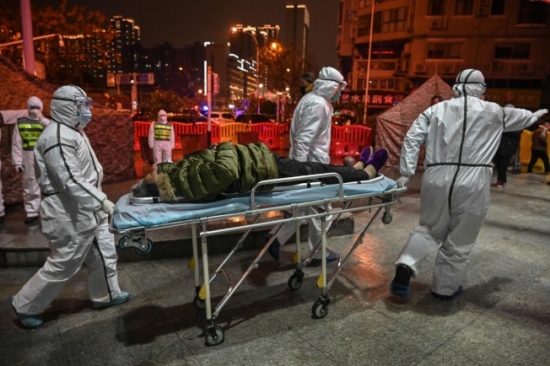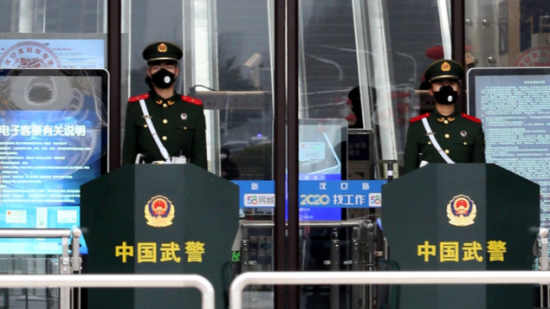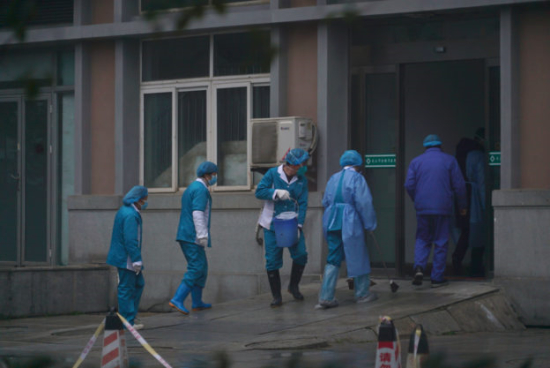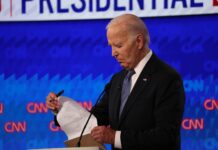Workers need to act: build unions / epidemic action committees in every workplace
The following text is from a leaflet issued by Socialist Action (CWI Majority in Hong Kong) as health sector workers and activists in the new trade union groups discuss plans for a strike on 3 February in protest over the Hong Kong government’s inadequate measures to deal with the coronavirus epidemic that has swept China and now also Hong Kong.
The epidemic which has caused massive disruption in China, could yet be declared an international health emergency. The rapid spread of the virus, officially called ‘2019-nCoV’, which attacks the respiratory system, has alarmed health experts. Some warn it poses a more serious threat than the Severe Acute Respiratory Syndrome (SARS), to which this virus is closely related, which killed 750 people and infected 8,000 in 2003. The SARS virus also originated in China. Capitalist economists, who’s focus is stock markets rather than human life, are warning the new virus could trigger a global recession.
The new coronavirus that originated in Wuhan is spreading at an alarming rate. Fear and a degree of panic exists among ordinary people in China and Hong Kong. Elsewhere concerns are growing as the spread of the epidemic accelerates and health officials warn it is becoming more contagious. The scale of the epidemic in China has been aggravated by the lack of clear information from the government. Widespread distrust of the authorities is based on people’s experience of previously mismanaged crises (SARS, 2008 toxic milk scandal, 2018 vaccine scandal).
The regime of Xi Jinping admits the situation is “grave”. Confirmed cases of infection have now been reported in around 20 countries outside China, and the reported deaths and infection rate is accelerating in China (100 dead at time of writing and 2,700 confirmed cases, a doubling in two days).
The initial [Chinese] government response was one of criminal neglect. We’ve seen this before. News was suppressed. Online information was blocked. The seriousness of the situation was completely underestimated and maintaining “stability” was the top priority. Many Chinese netizens are calling on social media for the removal and punishment of the Wuhan city leadership which is understandable because from December onwards, when the first cases occurred, they sat on the news and did nothing so as not to disrupt key government meetings in the first weeks of January. Valuable time was lost and the chance to “get control” of the epidemic was missed. According to virologist from Hong Kong University, Guang Yi, that was the golden period to get control and now even the effect of locking down whole cities to prevent the spread of the virus is limited.

The speed of events is scary. Human-to-human infection was only confirmed on 20 January. Three days later, the city of Wuhan (with 11 million inhabitants) was locked down, with all outward travel banned. In the next three days this quarantine and travel ban was extended to a further 20 cities, affecting some 60 million people. Trains, planes, ferries and buses are suspended and stations and toll roads are blocked by armed police.
Xi Jinping and the top regime leadership have been forced to take direct control of the crisis, because of the paralysis and lack of local initiative from the lower rungs of the Chinese authoritarian state – worse now even than during the SARS epidemic of 2003 – because local officials fear anything that could damage or embarrass the dictatorship. The concentration of all power at the centre and in the person of ‘Emperor Xi’ himself, means local governments don’t dare to move unless instructed by Beijing.
The actions of the Hong Kong government follow the same tragicomic pattern. They acted completely like a puppet and were paralysed from implementing any policies. On banning travel from high risk areas in mainland China and other emergency measures, Carrie Lam’s government has lagged behind even the steps taken by its Beijing bosses. The Hong Kong government refused to urge people in Hong Kong to wear face masks (because the government has tried to ban masks as part of its repressive onslaught against the 8-month-old protest movement).
Hong Kong’s Director of Health, Chan Hon-yee, even said there is no need to wear face masks during normal public activities, even while governments across mainland China, but also in Japan and South Korea, now instruct their citizens to wear masks. The Hong Kong government, in order not to lose face, stubbornly defends its anti-mask law from October, and stands firm with its plan to appeal against the High Court’s November decision to rescind that ban.
The long-suffering hospital system in Hong Kong needs urgent extra resources to meet this crisis, causing massive anger and a call for strike action on Monday 3 February. Socialist Action fully supports this strike initiative and calls on workers and activists in the unions and new union formations to mobilise solidarity for this strike.
We add our voice to those who say cancel the government’s proposed increase of police salaries (to reward them for half a year of unprecedented repression) and put this money into emergency measures to fight the epidemic, including to urgently improve the protective equipment for medical staff (it is reported there are over 10 million face masks in the warehouse of Department of Health while the staff at public hospitals do not have enough N95 masks to use) and ensure sufficient number of isolation wards.
The government needs to take measures to strictly ban price speculation and hoarding which includes face-masks and food during this crisis. Also the government must withdraw its legal appeal to reinstate the anti-face mask law.

The high speed train line [linking mainland China and Hong Kong] and the border should be closed immediately to contain the spread of the epidemic, not only for Chinese residents but all people. Socialists oppose the Hong Kong localists’ racist agenda to attack mainland Chinese people through this issue. The coronavirus does not discriminate – all ethnic groups and nationalities can be carriers and are at risk.
Hong Kong workers and unions need to support each other’s efforts to organise in every workplace, to build epidemic action committees with elected spokespersons to negotiate with management and ensure concrete steps are enforced that put the safety of employees and the general public as the top priority.
Workers must have the right to refuse to be sent to China during this crisis. Workers should also have the right to work from home and have flexible working hours to reduce crowding during rush hours. We cannot trust the government or company bosses to act in our interests. This must be fought for – through organising and spreading the unions and workplace committees. Masks, washing facilities, increased cleaning routines, and information meetings during paid working hours must be made available for all workers.
Hong Kong workers and unions should support all parallel efforts by mainland workers to improve their rights and form unions to win adequate protection and resources to meet the crisis. The struggles and sacrifices of China’s hospital workers in crisis cities like Wuhan, who are starved of resources and investment to deal with the huge scale of the crisis, makes us all sad and angry.
Workers’ solidarity and examples of building workplace committees in Hong Kong can inspire mainland workers to struggle for their rights. Mass action organised from below is the best way to fight this emergency, when we clearly cannot rely on the government to do the job.

The unions in Hong Kong should mobilise and fight for these steps urgently:
• Build the Epidemic Action Committees in all workplaces
• Right to refuse to be sent to China for work
• Right to work at flexible hours and work from home
• Right to operate the epidemic action committees in working hours
• Withdraw the court appeal to reintroduce the anti-face mask law
• Stop the police pay rise. Emergency funding for medical staff




